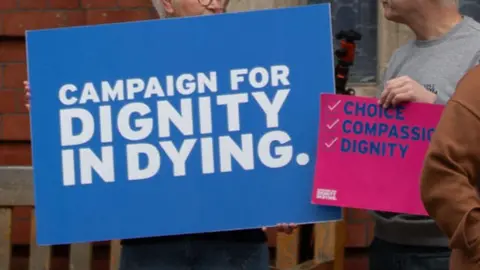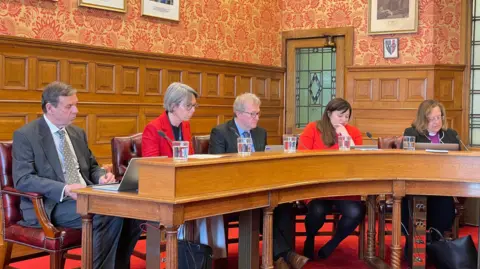BBC News, Isle of Man
 PA
PAProposed laws to give terminally ill adults on the Isle of Man the right to choose to end their own lives have been agreed by the Manx parliament.
It means the bill can now be sent for Royal Assent, making it the first parliament in the British Isles to take this step.
Under the provisions in the Assisted Dying Bill 2023, adults with a prognosis of 12 months or less to live would be given the right to choose to die.
Those eligible would have to be over the age of 18, and have lived on the island for five years.
The Royal Assent process is where the monarch formally approves a bill passed by parliament for it to become law.
Members of the Legislative Council agreed to the latest changes made to the Assisted Dying Bill 2023 by the House of Keys at a sitting earlier.
The proposed laws were brought forward in a Private Member’s Bill by Ramsey MHK Alex Allinson.
Those eligible must be terminally ill and “reasonably expected” to die within 12 months, over the age of 18, and be registered with an Isle of Man GP, and have been resident on the island for five years.
The person must also have the the legal capacity to make the decision, and have the decision verified by two independent doctors.
The politician, who is also a GP, said he was “hopeful” it could become law later this year and that an assisted dying service could be in place by 2027.
He said he had “met many patients who have wanted this option” and people on the Isle of Man had been trying to “provide dignity and autonomy for those who are facing an imminent death” for 20 years.
Since its first reading in October 2023, the bill has been considered at length by the House of Keys, the publicly elected house, and the Legislative Council, which is the parliament’s revising chamber.
During the hours of debate, which included evidence from medical professionals, concerns over how strict the safeguards would be, the risk of coercion, and eligibility criteria for assisted dying were heard.
Politicians also supported an opt-in system and conscientious objection option for health care professionals.
A third of doctors who responded to an Isle of Man Medical Society survey in 2023 said they would consider leaving the island if the legislation was introduced.
 MANX SCENES
MANX SCENESAllinson said he understood the concerns of those opposed to the move and the implementation of the law “would involve more consultation, more guidelines, more safeguards and more parliamentary debates in terms of the underlying regulations and secondary legislation”.
He said while the legislation would probably “only be used by a very small number of people”, but for them it was a “very important step forward, in terms of autonomy and choice at the end of your life”.

Chief executive of Dignity in Dying Sarah Wootton said it was “a historic moment for compassion in the Isle of Man and for the whole of the British Isles”.
Vicky Christian, chairman of My Death, My Decision Isle of Man said she was “incredibly proud that in the debate “compassion and evidence have prevailed”.
In February, a majority of changes to the 15-clause bill by the upper chamber were agreed by the House of Keys, but members rejected the council’s call to reduce the residency criteria from five years to one.
A proposed change that would have seen the medical professional overseeing a death not allowed to leave the patient alone at all during the process was also thrown out.

During Tuesday’s debate, a bid by the island’s bishop the Right Reverend Patricia Hillas to have that revised to allow for the person to express a wish to die alone, and allow for the medical professional to “not necessarily” be in the same room as the patient.
Rob Mercer MLC said that amendment threw up the “difficulties of handling the nuances of a person’s final wishes in primary legislation”.
Several members of the council agreed the issue could be given greater consideration during the drafting of the codes of practice and regulations implementing the proposed laws.
Ultimately, the bishop’s amendment was rejected, however changes made by the House of Keys to their revisions of the bill were accepted, allowing the bill to take its next steps towards implementation.



